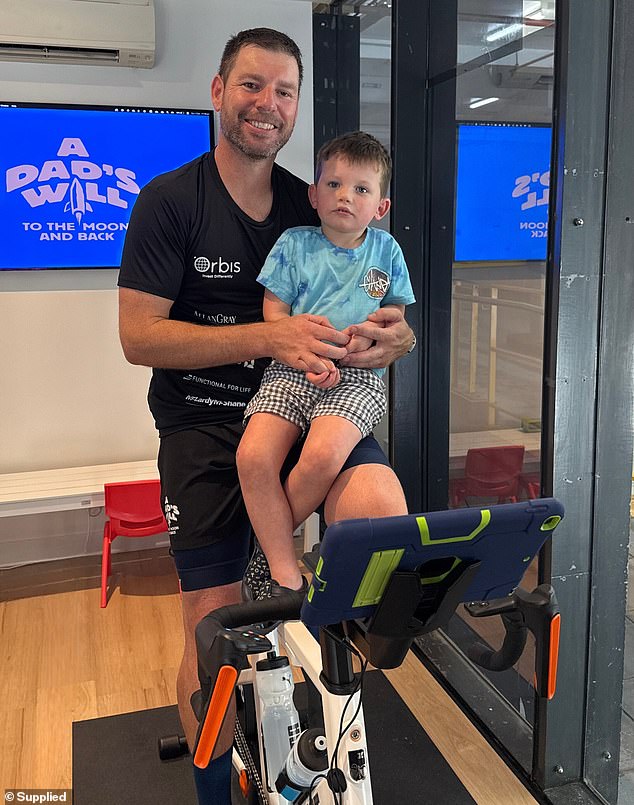A Melbourne father-of-two is embarking on an epic cycle to raise money for research into a rare neurogenetic disorder his young son suffers from.
Stu Place, 43, is covering the 15,451 kilometer distance to the US cities of Moon in Oklahoma and Back in Texas on a stationary bike from his home in Hampton East.
Her four-year-old son Will was born with SLC6A1, a rare and severe form of epilepsy that has no known cure, so Place hopes to raise $768,800 ($1 for every kilometer of distance to the Moon and back) for treatment. .
There are only 13 children in Australia with this disease which is so rare it doesn’t even have a name.
Will also suffers from intellectual disability, autism, does not speak at all and suffers from sleep, behavioral and movement disorders.
“It is a truly monstrous disease. “Every penny raised will go directly to the Florey Institute to support the development of a life-saving treatment for SLC6A1,” Place told Daily Mail Australia.
The Florey Institute of Neuroscience and Mental Health at the University of Melbourne is the largest brain research center in the southern hemisphere.
“We’re hopeful that all the money raised will allow (their research) to continue for another year or two, and maybe they can take it to clinical trials,” he said.
Melbourne’s Stu Place (pictured left) cycles to Moon and back to help raise funds for the treatment of his young son Will’s rare neurogenetic disorder (pictured right).
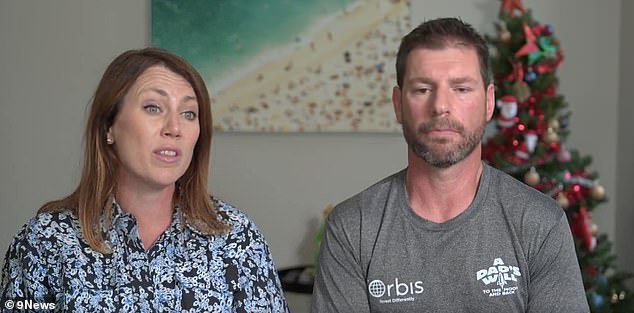
Will Place’s parents, Vicki (left) and Stu (right), appear at their home in Hampton East.
The gigantic virtual journey that Mr Place has undertaken since December 1 will last 50 days; Christmas Day marks the halfway point and almost a quarter of a million dollars has already been raised.
Place will continue pedaling on Christmas Day, but he will not try to travel the 300 kilometers that he tries to complete other days of the week.
Remarkably, he manages to do all the cycling while still working full time in the investment industry.
“I do at least 230km during the week and then on the weekends I do 250km every Saturday and Sunday,” Place explained.
“I bike 7.5 to 9.5 hours a day.”
Some days he travels about 300 kilometers, to compensate for the shortcomings and thus not have an overwhelming number of kilometers to finish on day 50.
His weekday cycling starts at 4.30am and covers about 100km between then and 7.30am, when he heads into the city for work.
At lunchtime, he bikes for a couple more hours at a place he’s rented near his work.
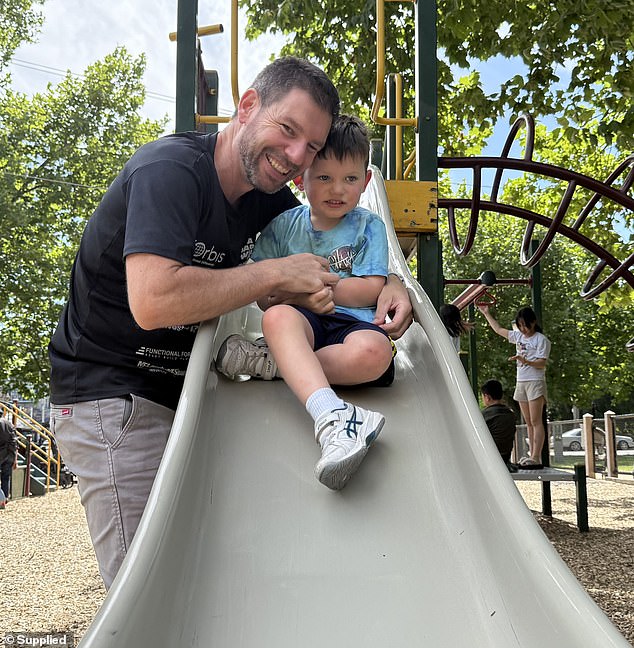
Will (pictured with his father) was born with SLC6A1, a rare and severe form of epilepsy.
Place and his wife Vicki also have an eight-year-old son named Angus.
“I try to get home by 6:30 p.m., spend an hour or two with the kids, and then when they’re in bed, I get back on the bike, which usually takes me until 10:30,” he said.
‘When I go out, I eat, I get ready for the next morning and I take a shower, I only sleep 4.5 hours most nights, except at weekends.’
The idea of cycling to the moon and back came to Stu and Vicki about two years ago.
‘We thought that concept could resonate with parents and loved ones, that is, almost everyone. You know, we go back to the moon for our loved ones and our children,” Place said.
‘Obviously, heading to the Moon was not possible. So we decided to look around the world for cities called Moon and Back and we found them both in the United States, which is quite surprising.’
But he didn’t get on the bike without practice.
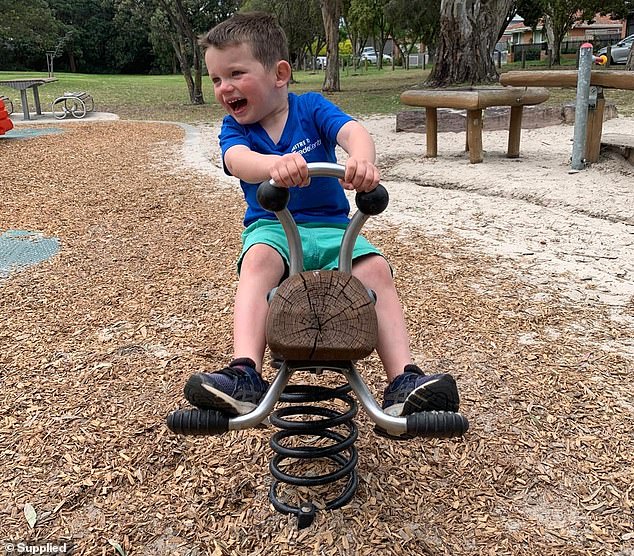
Will (pictured) also suffers from intellectual disability, autism, does not speak at all and suffers from sleep, behavioral and movement disorders.
“I’ve been on a specific training program for about 10 months, just to try to build on what I’m doing now,” he said.
Place said bicycling is “mentally and physically exhausting.”
‘YOIt is also a lot of stress for the family and for my wife, who takes care of the children at home and takes them to all their school and sports activities, etc.,’ he said.
“So right now she takes on 100 percent of the load at home.
But Place said it would all be worth it if the virtual marathon manages to raise a decent amount of money for research into this rare disease.
“It’s ambitious, but we’re reaching for the stars and we’re hopeful,” he said.
Will’s seizures are mostly under control with medication.
“The last time he had a round of seizures was about three or four months ago, while his body was growing and adjusting to different medications,” Place said.
“So she had a little relapse, but we were able to get her back, which was incredibly lucky for us.”
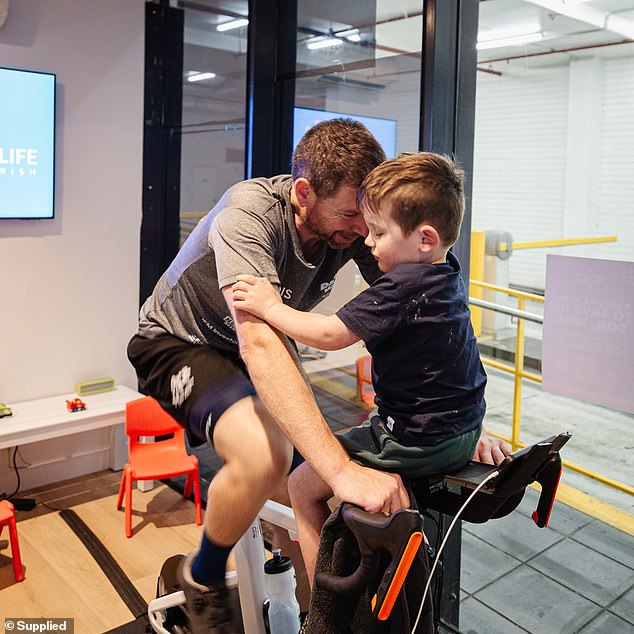
Will (pictured on the exercise bike) said cycling is mentally and physically exhausting.
Although Will can’t understand why his father spends so much time cycling lately, his older brother Angus does.
‘He knows what’s going on. PProbably more than I give him credit for. “You’re right,” Mr. Place said.
‘We had a good chat before the event about what I’m doing and why I’m doing it. But it’s not a typical conversation you have with an eight-year-old.
‘It’s a lot for him to digest and record. It’s difficult, because he asks a lot of questions about Will and what could happen and what happens if this doesn’t work out.
“It’s heartbreaking.”
You can contribute to the search for a cure and treatment for SLC6A1, Click here.


